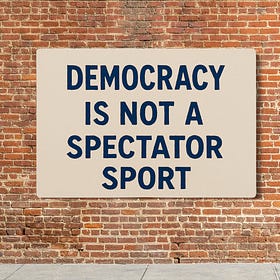What Happens When We Act Like MAGA?
Even progressives behave badly at protests. Here's how we can do better.
Last week, my friend
sent me a “cringey” video from a Tesla protest. It was a masterclass in how not to behave at a protest.If you’d muted the sound and blurred the signs, you might have mistaken it for a MAGA rally.
Protesters were shouting. Blocking the camera. Calling the reporter a “Nazi.” Almost no one talked to her—and the few who did weren’t exactly helpful.
But this wasn’t a MAGA event. It was an anti-Musk protest organized by progressives.
And that’s what made it so painful to watch: our fellow progressives' behavior undermining our cause.
Somewhere along the line, these protesters seemed to forget that the purpose of protest isn’t venting. It’s communication.
That means every word we say, every sign we carry, and every interaction we have tells a story—not just about the issue we care about, but about who we are.
The question is: Are we telling the story we want people to hear?
Because in this case, the story wasn’t “Elon Musk is dangerous.” It was, “We’re so angry we’re out of our minds.”
Why Protest?
Protests serve many purposes: to raise awareness, to educate, to show solidarity, and to signal public resistance. But at their core, they are about persuasion.
A successful protest moves people. Not just those who attend, but those who watch from the sidelines—on the street, on the news, or on social media. It offers a clear and compelling message that draws others in emotionally and intellectually.
That’s why participants need to come prepared:
Know the message.
Be ready to explain it.
Consistently reinforce it with your tone, your signs, and your behavior.
Because every protest is a public performance, and the audience isn’t just those who agree with us—it’s everyone who might be watching and wondering what we stand for.
Reporters Aren’t the Enemy
It’s easy to feel defensive when someone who seems hostile to your cause sticks a mic in your face at a protest. But letting emotions take the wheel in that moment is a missed opportunity.
Even when a reporter appears to be baiting you—especially a right-wing one—it’s still a chance to speak directly to the public. Instead of reacting with anger, pivot. Reframe. Speak to the people watching the clip who are curious, confused, or on the fence.
Staying calm doesn’t just help you stay on message—it flips the script. When you respond with poise and purpose, it’s the reporter who ends up looking bad. Their attempt to provoke you comes off as petty or cruel, while your composure underscores your credibility and compassion.
When you respond thoughtfully, you show not just what you believe—but who you are. That’s power. Use it.
Anticipate Editing—and Prepare Accordingly
Now, it’s entirely possible that some protesters gave thoughtful, respectful answers, but the reporter chose not to include them. That wouldn’t be surprising. Her goal likely wasn’t fairness; it was to make the protest look ridiculous.
But that’s all the more reason we have to work harder to ensure everyone is on message.
One way to do that is to prepare people in advance. Most protests these days require digital registration. That provides an easy opportunity: send a pre-event email with simple press guidelines and messaging suggestions. Let people know what kinds of questions to expect, how to respond without escalating, and why staying calm and clear is the most powerful thing they can do.
Another way to do it is to have a protest leader on site who talks with journalists and reminds participants to stay on message.
Five Common Protest Pitfalls to Avoid
1. Silencing Other Voices
When we try to silence someone by yelling over them interrupting them, or refusing to hear them out, we shut down any chance of meaningful dialogue. It might feel satisfying in the moment, but it is fundamentally anti-democratic and sends a clear there is no place for them in our movement.
2. Making Broad, Moral Judgments
Labeling people as Nazis or imbeciles may feel righteous, but it undermines both our credibility and our cause. These kinds of moral indictments don't distinguish between toxic ideologies and the everyday people who get swept up in them. If we want to weaken MAGA, we must stop dehumanizing those caught in its grip.
3. Withholding Your Why
When someone asks why you're protesting, that’s your moment of opportunity—not an interrogation. If you can’t explain why you’re there, or worse, you refuse to, you miss a chance to inspire curiosity and reflection. Even if the person asking seems hostile, someone watching may be genuinely open. Don't waste the moment.
4. Acting Like You’re Better Than Everyone Else
Progressivism isn’t about moral superiority—it’s about shared humanity. When we act like we’re better, smarter, or more enlightened than others, we contradict the very values we claim to uphold. When we look down on other people, we push them away instead of inviting them into the movement.
5. Letting Your Emotions Take Over
You might be at the protest because you are angry, but you can’t let that anger do the talking. Angry protesters make outside observers defensive, not curious. And it’s easy to write off the concerns of someone who is too angry to have a rational conversation about why they’re protesting in the first place.
What We Can Do Instead
Calmly and respectfully answer their questions in a productive manner.
One of the most powerful ways to do that is to tell stories—real, human stories that connect values to lived experience. Like this one:
“I used to own a Tesla. I bought it because I care about the environment. But when I saw Elon Musk doing a Nazi salute, I couldn’t unsee it. My great-grandparents died in the Holocaust. I couldn’t live with myself if I kept driving that car—and neither should other Americans.”
That one story does more to persuade than a dozen angry signs or chants. It’s honest. It’s personal. And it draws a clear moral line without being cruel or combative.
Better Answers, Better Protest Outcomes
Here are a few interactions from the video with suggestions for how they could have gone better.
Example 1
Reporter: “Why are you out here protesting Tesla?”
Protester response: “Because Musk is a fascist.”
What they should have said: “We’re here because Elon Musk is dismantling essential federal agencies like Veterans Affairs and the Department of Education and the Environmental Protection Agency. We believe no one—and especially not an unelected billionaire—should have unchecked power over our government.”
Example 2
Reporter: “Do you support the recent vandalism of Teslas?”
Protester response: [Avoided the question, or gave a vague denial.]
What they should have said: “Absolutely not. We support peaceful protest. Our fight is with inhumane policies, not with property or people. Violence is wrong.”
Example 3
Reporter: “Are the people inside this Tesla store Nazis?”
Protester response: “Yes.”
What they should have said: “Of course not. Our issue isn’t with the workers—it’s with a single billionaire who has hijacked our government for his own purposes.
Let’s Not Become What We’re Fighting Against
To save democracy, our methods must be grounded in democratic values. That means respect. That means dialogue. That means treating people who disagree with us with dignity.
It’s not just the right thing to do. It’s the most effective way to achieve our political goals.
So, before you head to your next event, get ready to talk to the media. Know the protest message. Be able to put your why into words. And prepare to share a personal story that will bring your cause home.
The success of our movement depends upon it.
The Message Is the Movement: Your Guide to Smarter Protest Signage
The April 5th "Hands Off!" protests were awesome—massive in scale, urgent in tone, and deeply necessary. In over 1,400 cities across the United States, people poured into the streets to demand that President Donald Trump and Elon Musk leave our essential government services alone.
10 Steps for Saving Democracy
“Not everything that is faced can be changed, but nothing can be changed until it is faced.” —James Baldwin
How to Stop Panicking About Trump
Most progressives believe their level of political distress is purely a function of external events.
Wonder Why the Movement Against Trumpism Feels So Fragile? There's a Void Where Its Heart Should Be
Outrage is a powerful spark, but it burns out fast. To truly resist authoritarianism, we need something deeper—a culture of resistance.









Great article. I think the MSM undermines the message a little when they seem biased toward covering MAGA bad behavior more than the anti-Trump bad behavior. I think the MAGA crowd pointed that out during the 2020 riots as well. The MAGAs aren't playing fair for sure, but like your article alludes to, we have to be better at the anti-Trump messaging and actions.
Well said, Karin.
I only hope the people who need to take this to heart do.